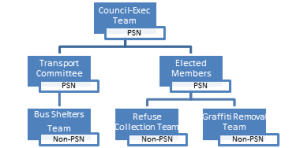With the increase in number of mobile devices and applications used by government institutions, and the ever-evolving nature of the mobility sector as a whole, public sector IT administrators are being challenged to ensure that public services network (PSN) security requirements are being met, or else risk being cut off from key government online services. The government’s push for PSN compliance aims to improve the quality of public services available on the government’s secure network to public sector authorities and public institutions, allowing these institutions to collaborate effectively and economically. Access to PSN, however, requires a network infrastructure and connectivity that is deemed secure by CESG, the information security arm of GCHQ.
To achieve PSN compliance, government institutions should consider the different security profiles and roles of users and the risks that these users present to network security. While core executive teams may be granted secure devices that are enrolled and securely managed through an enterprise mobility management (EMM) solution, other operational job roles in the organisation may not require to access PSN services, and should therefore be managed with different, cost-effective controls like Bring Your Own Device (BYOD) management schemes.
Multi-tenancy management
To drive efficiency and increase employee productivity, budget-conscious public sector institutions find themselves constrained to provide their employees with remote access to official information on mobile devices. Enterprise mobility management (EMM) software provides a secure IT management solution to help public sector bodies address security concerns surrounding PSN compliance, while also considering tight budgets and resource limitations. With a role-based, multi-tenancy EMM platform, organisations can opt to deploy only relevant low-risk corporate content to non-PSN devices by enabling a BYOD strategy.

Figure 1: Hypothetical role-based, multi-tenancy structure.
Multi-tenancy allows remote and secure access to corporate data depending on employee job roles, user group and risk profiles within an organisation without compromising its network security. What is important here is to maintain the right levels of security, for the right levels of risk and for the right user group, which is compatible with PSN guidelines.
Secure content applications
Public sector institutions can also make use of enterprise-level file sharing programs to mitigate data loss risks, while allowing users to securely access official information through an encrypted tunnel. Access can be managed and monitored at the organisational level from a central console, strengthening data loss prevention. The management console constantly monitors managed devices for unauthorised users, compromised devices, blacklisted apps and other security risks. When a threat is identified, the software can block access to enterprise email, applications and resources, allowing administrators to either lock or wipe a device automatically through a compliance engine.
The tendency of public sector organisations in the past was to issue Blackberry devices and be satisfied with email and calendar. However, today’s users require richer, more process-orientated applications to support them in their job roles and reduce the number of devices they need to carry. With many organisations planning their migration from Blackberry devices, EMM platforms provide a flexible solution to manage a multi-device and multi-platform infrastructure at an organisational level, while allowing IT administrators to maintain visibility and control of devices under their particular location or department.
 By Ian Evans
By Ian Evans
Senior Vice President and Managing Director, EMEA, AirWatch by VMware
Ian Evans is senior vice president and managing director, EMEA, at AirWatch by VMware. He is responsible for growing AirWatch’s business in the European, Middle Eastern and African regions. Evans brings more than 20 years of experience in the software industry to AirWatch, with more than 10 years in direct and channel sales. Prior to joining AirWatch, Evans worked at a number of global private companies. At Astea, a worldwide software solutions company, Evans served as managing director, EMEA. Before Astea, he was director, EMEA for O4 Corporation, a global software company that focuses on delivering mobile sales solutions to the consumer goods and retail industry. Prior to that, Evans was vice president at Infor Global Solutions where he focused on increasing sales for the company in EMEA. Evans was also a sales director at Pivotal Software, a subsidiary of China.com.
The opinions expressed in this post belongs to the individual contributors and do not necessarily reflect the views of Information Security Buzz.



